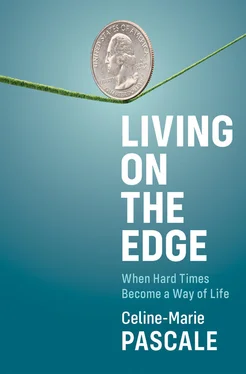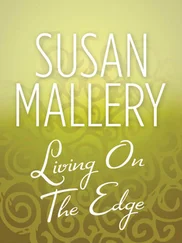Things did get better for us – in part because more resources came in and in part because eventually there were fewer mouths to feed. By the time I was in high school, we no longer worried about food. Yet none of us had ever learned to think much about the future. My family’s expectations for me were simple: graduate from high school, get married, and have babies. Many of my friends followed that path, some dropped out of high school to get married, or left high school for vocational training, while two became pregnant in senior year. My brothers were expected to graduate from high school (fingers crossed on this one) and get a job through the want ads in the local paper. If that plan failed, joining the military was the only option. The mantra so often attributed to Steve Jobs, “Do what you love; love what you do,” has never been an option for everyone. The ability to choose a career because you find it personally rewarding is itself a form of socio-economic privilege.
With the help of someone who was attending college, to whom I will be forever grateful, I hatched what I thought of as an escape plan. It required that I keep my high school grades up while working two part-time jobs. As a result, I am first in my family to go to college. But a college degree isn’t necessarily a ticket out of poverty. If a crisis can plunge folks into desperate conditions very quickly, getting out of poverty is much harder. Escaping poverty requires having almost nothing go wrong for about twenty years. 1As I soon learned, there is no end to the things that can go wrong in twenty years. After graduating from college, sometimes I had a “good job” that didn’t pay enough; sometimes I scraped by on temporary work. At various times in my adult life I’ve stood in food bank lines and received food stamps. 2I have shared meals with too many good people who will never escape poverty, many of whom survive on commodity foods provided by the USDA. These are also referred to as “canned food products” and I can say from experience that canned meat, cheese, and butter only vaguely resemble food.
Social safety nets, weak as they may be, help many families get to more stable times. Food stamps were once essential to my ability to simply eat twice a day. Today, I buy groceries without keeping a running tab in my head of the cost of each item, and I no longer break into a sweat in the checkout line. I have learned to make a monthly budget, opened a retirement account, and weathered several family medical crises without facing eviction. Against the prevailing odds, I became one of 4.5% of people in the United States who hold a doctorate degree. And rarer yet is that fact that I am a first-generation student who is also a full professor. However, I don’t think of my story as one of class mobility so much as a strategic escape – one that comes with tremendous advantages, but which exacts a very high cost. For me, the price of admission into the upper middle class has been alienation in almost limitless forms. I have changed how I speak, the clothes I wear, the food I eat, what I do with my free time – I can’t think of any aspect of my life that has been left untouched. Not one. I have rarely been in environments that valued class differences. As kids, we grew up knowing that we were judged as being fundamentally lacking or deficient by wealthier others. We internalized those judgments in different ways, and defended ourselves against them with our own judgments about “people who put on airs” or “who had no common sense.” Class migration brings intense pressure to assimilate into the very cultures that judge poorer people. Consequently, even modest assimilation can feel like a profound betrayal of friends and family. On the other side, no amount of assimilation ever seems to bring real belonging.
My personal experience shaped my research for this book – from the questions I asked, to my ability to be a credible partner in the interviews themselves. My training as a sociologist gave me other resources – an understanding of structural issues, an appreciation of the importance of contexts, and the willingness to approach complete strangers. I know from both experience and training that wealth and poverty are structural issues that cannot be explained by personal characteristics – not by ambition or laziness, not by intelligence or ineptitude, not by substance abuse or mental health. I certainly encountered people with unresolved personal issues while on the road, but no more than I encounter among successful professionals. Personal characteristics contribute to one’s quality of life, but they do not create systemic poverty in a nation.
It’s common to hear people use the term “working class” as if it is synonymous with low-wage, unskilled work. But it hasn’t always been that way. Well into the 1970s, the term “working class” designated a kind of labor that required various levels of skill and which was physically demanding – so much so that it often placed workers’ health and well-being at risk. The blue-collar workers who held those jobs earned a middle-income wage that paid for a mortgage, a family car, often a boat or recreational vehicle, and sometimes a vacation home. Those jobs have largely disappeared. Today’s workplace is primarily divided between two kinds of jobs: high-skill, high-wage jobs and low-skill, low-wage jobs. 3Today the term “working class” is most often used as a euphemism for poor people, many of whom work in service sector jobs.
In contrast to working-class jobs, service sector employment is largely characterized by low pay, part-time hours, no benefits and general instability. 4Some people use terms like “the poor” or “the working poor” to describe people who work full-time yet struggle financially. Honestly, I have never met working people who used these terms to describe themselves . My family wasn’t alone in calling ourselves middle class, when we couldn’t even count on having adequate food. But when I was on the road, I heard something different. When I asked people how they saw themselves in terms of class, some declined to say. They told me they just don’t think about class. Many others described themselves as belonging to “the struggling class.” Two things about this term are really important to me: First, this isn’t a label or an understanding imposed on people from the outside. This is how people talked about themselves . Second, the term “the struggling class” addresses economic hardship in ways that I consider to be profound; it encompasses the danger, the dignity and the hope that characterize the lives of people I met. They are not getting ahead, but they have not given up. They struggle. They weigh how long they can go without treating a bad tooth or if they can afford to pay for groceries if they buy shoes for their child. Despite working one or two jobs, they know that a single unexpected event could force them deeper into financial troubles from which they might never emerge. People in the struggling class live paycheck to paycheck, doing the very best they can for themselves, their children, and often their extended families. They live in the hope that one day they will find themselves on a solid economic footing – a hope they hold against all the odds.
The term “the struggling class” seems more accurate than anything I have ever heard used to describe a group of people working hard to keep their heads above water. Belonging to the struggling class isn’t a single kind of experience. There are individual differences, of course, but more importantly class experience varies by race, gender and region. These differences will become apparent by the kinds of experiences people do or don’t encounter. No one featured in this book was asked to speak for anyone but themselves. Yet it is my hope that their voices will help to change how the nation thinks about the struggling class. It is impossible to fully understand the experiences of the struggling class without understanding some of the concepts that are used to identify economic hardship. The concepts may seem a bit technical, but they will help to bring some insight into things that generally don’t make sense: a booming economy that leaves most families living paycheck to paycheck, families who can’t afford basic living expenses but don’t qualify as poor enough for assistance, and the way politicians talk about folks being left behind. The rest of this chapter lays out three key frameworks that are often used when people talk about the economy: work, housing, and poverty.
Читать дальше












